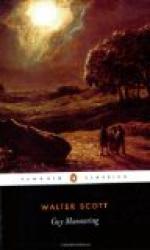Note 2, p. 198
It is fitting to explain to the reader the locality described in chapter xxii. There is, or rather I should say there was, a little inn called Mumps’s Hall, that is, being interpreted, Beggar’s Hotel, near to Gilsland, which had not then attained its present fame as a Spa. It was a hedge alehouse, where the Border farmers of either country often stopped to refresh themselves and their nags, in their way to and from the fairs and trysts in Cumberland, and especially those who came from or went to Scotland, through a barren and lonely district, without either road or pathway, emphatically called the Waste of Bewcastle. At the period when the adventures described in the novel are supposed to have taken place, there were many instances of attacks by freebooters on those who travelled through this wild district, and Mumps’s Ha’ had a bad reputation for harbouring the banditti who committed such depredations.
An old and sturdy yeoman belonging to the Scottish side, by surname an Armstrong or Elliot, but well known by his soubriquet of Fighting Charlie of Liddesdale, and still remembered for the courage he displayed in the frequent frays which took place on the Border fifty or sixty years since, had the following adventure in the Waste, which suggested the idea of the scene in the text:—
Charlie had been at Stagshawbank Fair, had sold his sheep or cattle, or whatever he had brought to market, and was on his return to Liddesdale. There were then no country banks where cash could be deposited and bills received instead, which greatly encouraged robbery in that wild country, as the objects of plunder were usually fraught with gold. The robbers had spies in the fair, by means of whom they generally knew whose purse was best stocked, and who took a lonely and desolate road homeward,—those, in short, who were best worth robbing and likely to be most easily robbed.
All this Charlie knew full well; but he had a pair of excellent pistols and a dauntless heart. He stopped at Mumps’s Ha’, notwithstanding the evil character of the place. His horse was accommodated where it might have the necessary rest and feed of corn; and Charlie himself, a dashing fellow, grew gracious with the landlady, a buxom quean, who used all the influence in her power to induce him to stop all night. The landlord was from home, she said, and it was ill passing the Waste, as twilight must needs descend on him before he gained the Scottish side, which was reckoned the safest. But Fighting Charlie, though he suffered himself to be detained later than was prudent, did not account Mumps’s Ha’ a safe place to quarter in during the night. He tore himself away, therefore, from Meg’s good fare and kind words, and mounted his nag, having first examined his pistols, and tried by the ramrod whether the charge remained in them.




